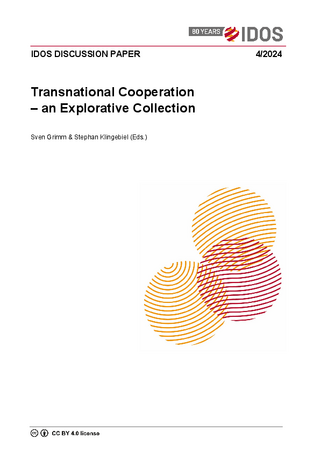
Transnational cooperation and social contracts
Furness, MarkMitarbeiter sonstige (2024)
in: Sven Grimm / Stephan Klingebiel (eds.), Transnational cooperation – an explorative collection, Bonn: German Institute of Development and Sustainability, 24-27
ISBN: 978-3-96021-229-4
DOI: https://doi.org/10.23661/idp4.2024
Social contracts govern the core of state–society relations. In the West, the social contract concept has been debated among political philosophers and social scientists since the Enlightenment and the work of Hobbes, Locke and Rousseau (Morris, 2000). Early conceptualisations focussed on relationships between the individuals that make up a society and their relationships with the sovereign. However, the social contract is not just a Western philosophical concept setting out an ideal form of socio-political and economic organisation. Indeed, as Nyabola (2021) points out, non-Western ideas and traditions have helped shape the understanding of the social contract. At its most basic level, the social contract captures why people consent to be governed, why rulers place limits on their arbitrary power, how societies that people want to live in are organised, and how individuals and groups cooperate to ensure collective security and welfare. Governments can rule by repression rather than by consent, but they rarely succeed in the long run without at least some legitimacy emanating from a social contract. The universality of social contracts and their central role in deciding who gets what and why makes them highly relevant for development policy and transnational cooperation.

